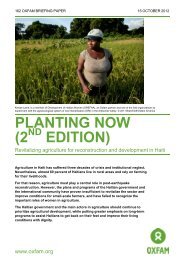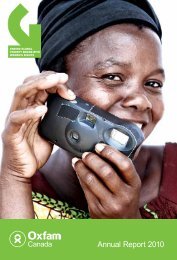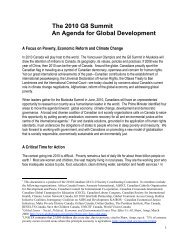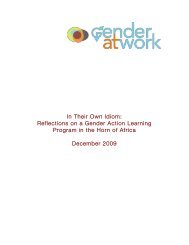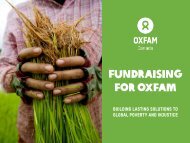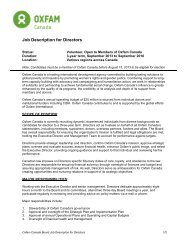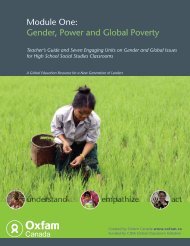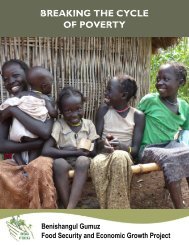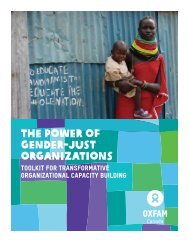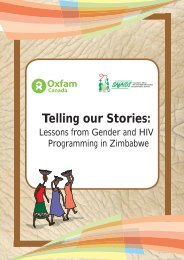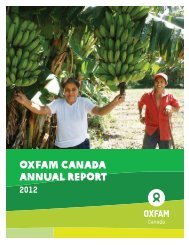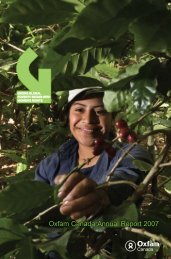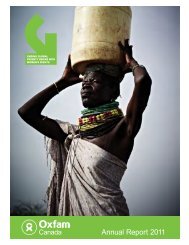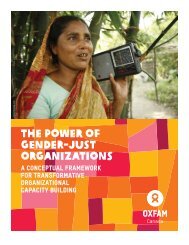The New Forests Company and its Uganda ... - Oxfam Canada
The New Forests Company and its Uganda ... - Oxfam Canada
The New Forests Company and its Uganda ... - Oxfam Canada
Create successful ePaper yourself
Turn your PDF publications into a flip-book with our unique Google optimized e-Paper software.
In short, the company <strong>and</strong> the officials it dealt with appear to have satisfied themselves<br />
that most of the people in the Namwasa <strong>and</strong> Luwunga plantations were not allowed on<br />
that l<strong>and</strong> <strong>and</strong> should not have been living there.<br />
But people were living there.<br />
<strong>Oxfam</strong> research indicates that around 7,400 people were living on the Namwasa<br />
plantation <strong>and</strong> at least 15,191 people on the Luwunga plantation. 28<br />
NFC <strong>and</strong> government officials have called these people ‘encroachers’ (or ‘illegal<br />
encroachers’). <strong>Oxfam</strong> believes this is a dangerously loaded term because it pre-judges<br />
people’s rights <strong>and</strong> dehumanizes them, making it easier to justify violent tactics. And it is<br />
arguably a highly misleading term too, because the people maintain that they did in fact<br />
have lawful entitlement to the l<strong>and</strong> <strong>and</strong> were testing that argument in ongoing legal cases.<br />
<strong>The</strong>se claims are resisted by NFC <strong>and</strong> neither case has been concluded.<br />
In Kiboga, many of the people say they were born on the l<strong>and</strong>, while others say they had<br />
lived there since the early 1970s, building up 40 years’ worth of social <strong>and</strong> communal<br />
services <strong>and</strong> physical infrastructure. Some people say they had bought <strong>and</strong> sold plots<br />
during that time. In Mubende, the Second World War veterans <strong>and</strong> their descendants say<br />
they were allocated l<strong>and</strong> in recognition of service, while others say they had bought, were<br />
gifted, or inherited l<strong>and</strong> in the area since the 1980s. In their legal pleadings, the claimants<br />
assert that they are ‘either bona fide, lawful occupants <strong>and</strong>/or customary tenants <strong>and</strong> are<br />
protected by the constitution of the Republic of Ug<strong>and</strong>a <strong>and</strong> the l<strong>and</strong> laws of Ug<strong>and</strong>a.’ 29<br />
NFC states that these proceedings, launched against the company, were misdirected<br />
since the government, rather than NFC, was responsible for undertaking the evictions. 30 It<br />
says that the claims ‘have been taken most seriously <strong>and</strong> have been the subject of<br />
extensive legal counsel <strong>and</strong> internal inquiry’, 31 <strong>and</strong> maintains that ‘the cases have failed to<br />
appear in court due to the inability of the plaintiffs to assert a legitimate case’. 32 <strong>The</strong><br />
Mubende claims, it says, have ‘been confirmed erroneous by the extensive investigation<br />
conducted by the third Prime Minister’s office’. 33 NFC base this on an FSC audit,<br />
conducted by SGS, which states that the validity of the claims is ‘highly dubious’ <strong>and</strong> that<br />
the company acted responsibly to resolve the issue of encroachment. However, <strong>Oxfam</strong><br />
has been told by lawyers representing the community members that the cases are still<br />
active, <strong>and</strong> this has been acknowledged by NFC. 34 This means that claims brought by<br />
thous<strong>and</strong>s of people remain unresolved.<br />
In both legal cases, the High Court considered that the communities’ concerns were<br />
sufficiently urgent <strong>and</strong> their arguments sufficiently strong 35 to justify granting orders<br />
restraining evictions until the full case could be heard in court. 36<br />
NFC claimed – in <strong>its</strong> 2011 Project Design Document submitted to the CDM – that people<br />
vacated the l<strong>and</strong> in Mubende ‘voluntarily <strong>and</strong> peacefully’. However, the communities<br />
<strong>Oxfam</strong> spoke to describe the evictions as anything but voluntary or peaceful. People told<br />
<strong>Oxfam</strong> that the army <strong>and</strong> police were deployed in the area to enforce the evictions <strong>and</strong><br />
that many people were beaten during the process. 37 Some villagers also claim that casual<br />
labourers whom they believe were employed by NFC joined the police <strong>and</strong> army in<br />
burning homes, destroying crops, <strong>and</strong> butchering livestock. 38 <strong>The</strong> pleadings in the claim<br />
brought by the Kiboga community allege that NFC ‘purporting to be a licensee of [the<br />
NFA], trespassed on the Plaintiffs’ l<strong>and</strong>, destroyed homes, crops, <strong>and</strong> animals of the<br />
Plaintiffs <strong>and</strong> attempted to evict the Plaintiffs’. <strong>The</strong>y also allege ‘trespass, uncivility,<br />
harassment, <strong>and</strong> abuse’ by NFC <strong>and</strong> <strong>its</strong> agents. <strong>The</strong> Mubende evictees claim that<br />
employees of NFC were ‘evicting, harassing, erasing their plantations, demolishing their<br />
houses, intimidating, mistreating’ them. 39 <strong>New</strong>s of the evictions, albeit not referring to<br />
NFC as the perpetrator, was published in local media <strong>and</strong> the dispute was described in<br />
the communities’ law su<strong>its</strong> filed in 2009. 40<br />
NFC firmly denies involvement in any evictions or violence <strong>and</strong> says ‘there were no<br />
incidences of injury, physical violence, or destruction of property during the voluntary<br />
vacation process that have been brought to the attention of NFC’. 41 It continues to rely on<br />
the FSC audit of the Mubende evictions which states that ‘there were no incidences of<br />
injury to the encroachers or forceful eviction reported during this process’. 42 It also states<br />
4<br />
<strong>The</strong> <strong>New</strong> <strong>Forests</strong> <strong>Company</strong> <strong>and</strong> <strong>its</strong> Ug<strong>and</strong>a plantations<br />
<strong>Oxfam</strong> Case Study, September 2011



